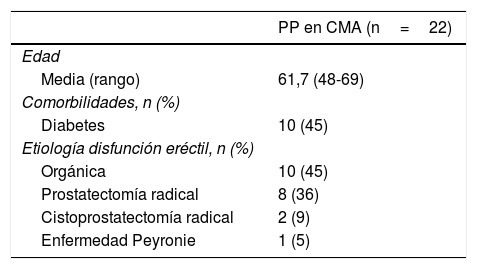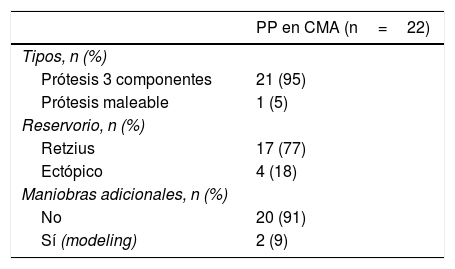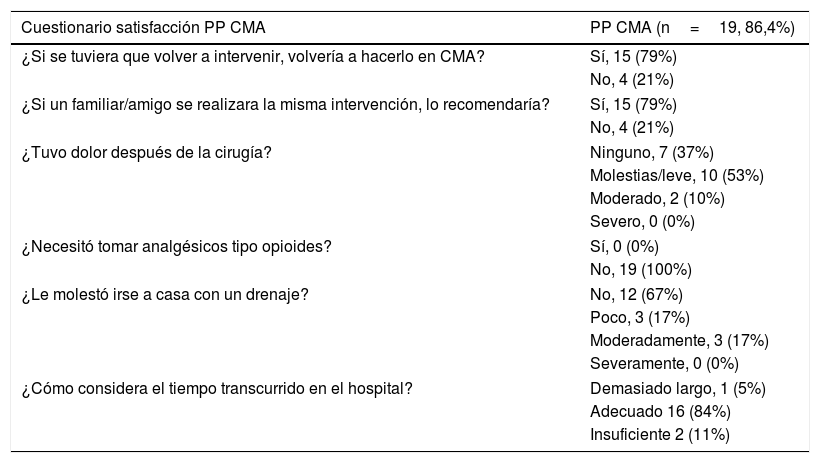El implante de prótesis de pene (PP) es llevado a cabo en muchos centros como régimen de hospitalización. Recientemente en nuestro centro hemos iniciado su realización como cirugía mayor ambulatoria (CMA), reduciendo la estancia hospitalaria.
El objetivo de este estudio ha sido evaluar la viabilidad, complicaciones y satisfacción de las PP implantadas en CMA en nuestro centro.
Material y métodosEstudio observacional retrospectivo de los resultados y satisfacción de las PP realizadas en CMA en el Hospital Universitario de Bellvitge durante 2018.
ResultadosEn 2018 se realizaron 49 PP: 27 (55,1%) hospitalizadas y 22 (44,9%) ambulatorias. De estas 22, 2 (9,1%) fueron segundos implantes. Los pacientes recibieron anestesia general y bloqueo locorregional crural, dorsal del pene y del plano transverso del abdomen (TAP). Las tasas de complicaciones entre hospitalizados y CMA fueron similares, 2 (7%) y 1 (5%) respectivamente, sin reportar ningún caso de infección ni requerir la retirada del implante.
Postoperatoriamente se realizó una encuesta telefónica contactando a 19 (86%) pacientes: 16 (84%) consideraron adecuado el tiempo de estancia, 15 (79%) volverían a intervenirse en CMA y 15 (79%) lo recomendarían, siendo el motivo de reticencia la preocupación por la falta de asistencia médica en el domicilio y evitar volver a las 24h para retirar el drenaje. Todos tuvieron buen control del dolor sin requerir mórficos en el postoperatorio.
ConclusionesEn nuestra serie, el implante de PP en CMA ha resultado ser viable y seguro. A pesar de que existen puntos de mejoría, se mantiene una correcta satisfacción del paciente y buen control del dolor, sin implicar un aumento de las complicaciones ni readmisiones.
Penile prosthesis (PP) surgery is performed in many institutions as an inpatient procedure. We have recently initiated a major ambulatory surgery (MAS) program, thus reducing the hospital stay.
The objective of this study was to assess the feasibility, complications and satisfaction of the implantation of outpatient surgery PP program in our hospital.
Material and methodsRetrospective observational study evaluating the results and satisfaction of PP implanted as an outpatient procedure in Bellvitge University Hospital during 2018.
ResultsDuring 2018 we implanted 49 PP: 27 (55%) inpatient surgeries vs. 22 (45%) outpatient surgeries. Of these 22, 2 (9%) were second implants. All patients underwent both general anesthesia and crural, proximal dorsal nerve and transversus abdominis plane block (TAP). Complication rates between inpatient and outpatient procedures were similar, 2 (7%) and 1 (5%), respectively, without reporting infections or requiring PP removal.
Postoperatively, a satisfaction telephone survey was conducted in 19 (86%) patients: 16 (84%) considered the time of hospital stay as appropriate, 15 (79%) would have preferred to be operated again in an outpatient care setting and 15 (79%) would recommend it. The patients’ main concerns were related to being at home with no medical assistance at home and about coming back the next day for drainage removal. All patients reported well-controlled pain without requiring opioid intake in any case.
ConclusionsIn our series, PP implantation in an ambulatory care setting is feasible and safe. Although there are some aspects that should be improved, the program showed acceptable satisfaction rates and an adequate postoperative pain control, neither raising the administration of opioids, nor increasing complications and re-admission rates.
Artículo
Comprando el artículo el PDF del mismo podrá ser descargado
Precio 19,34 €
Comprar ahora

















